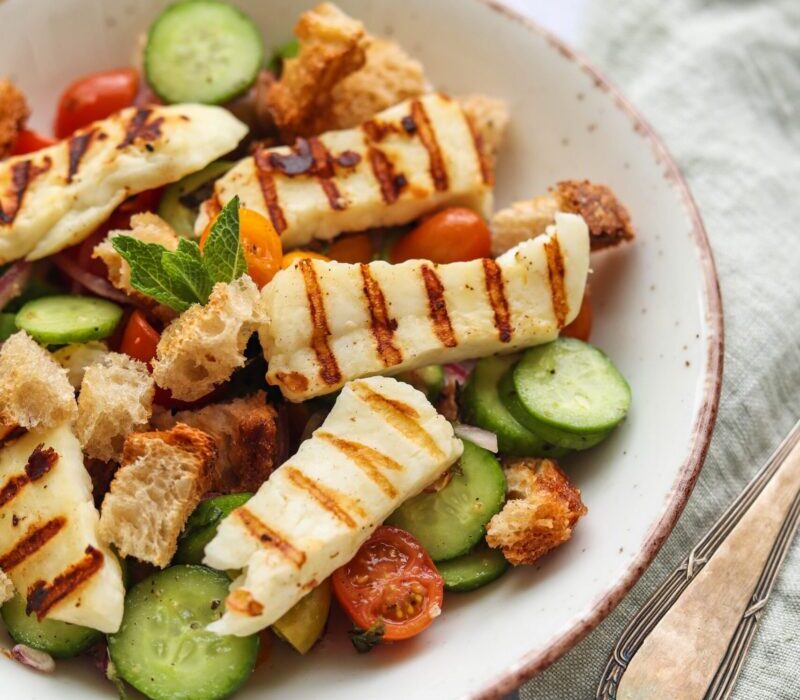The Mediterranean way of life is filled with flavoursome and delicious foods.
The Mediterranean diet, a culinary tradition rooted in countries bordering the Mediterranean Sea, is acclaimed for its diverse and balanced approach to nutrition.
Characterized by high consumption of fruits, vegetables, whole grains, legumes, olive oil, and moderate fish, poultry, and dairy products like halloumi cheese, this diet stands out for its minimal reliance on processed foods and red meat.
Numerous studies underscore the prominence of the Mediterranean diet in health and longevity discussions. These investigations often highlight the diet’s role in reducing the risk of heart disease, certain cancers, type 2 diabetes, and neurological disorders.
Jump to RecipeCardiovascular Benefits
Cardiovascular diseases remain a leading cause of mortality globally, but the Mediterranean diet offers a beacon of hope.
A landmark study, the Lyon Diet Heart Study, demonstrated a significant reduction in recurrent heart attacks among individuals adhering to a Mediterranean diet.
The diet’s cardiovascular benefits are largely attributed to its high content of monounsaturated fats, primarily from olive oil, and its abundant use of anti-inflammatory and antioxidant-rich foods. The integration of foods like halloumi, a cheese known for its rich protein content and moderate fat, complements the diet’s heart-healthy profile by providing essential nutrients without excessive saturated fat.
Neurological Advantages and Longevity
Emerging research suggests a compelling link between the Mediterranean diet and neurological health, including a reduced risk of Alzheimer’s disease and slower cognitive decline.
The diet’s emphasis on plant-based foods and healthy fats contributes to maintaining brain health, potentially influencing longevity. The high levels of antioxidants and anti-inflammatory compounds in the diet are thought to combat oxidative stress and inflammation, key contributors to neurodegenerative diseases.

The Power of Tomatoes
Tomatoes, a staple in the Mediterranean diet, are renowned for their health benefits. Rich in lycopene, a potent antioxidant, tomatoes offer protective effects against certain types of cancer, particularly prostate cancer.
Lycopene’s role in reducing LDL cholesterol levels and blood pressure further bolsters the cardiovascular benefits of the Mediterranean diet. Moreover, the versatility of tomatoes, whether consumed fresh, cooked, or as part of sauces, ensures their consistent presence in the Mediterranean culinary palette, enhancing both the flavour and nutritional profile of the diet.

The Role of Halloumi
Halloumi, a semi-hard, unripened cheese traditionally made from a mixture of goat’s and sheep’s milk, is a delightful component of the Mediterranean diet. Its high melting point allows for a unique culinary application — grilling or frying without losing shape or texture.
Nutritionally, halloumi is a valuable source of calcium and protein. While it is higher in fat and salt than other dairy products, consumed in moderation within the context of the Mediterranean diet, halloumi contributes to the diet’s overall nutritional richness and taste diversity.
Embracing the Mediterranean Lifestyle
In conclusion, the Mediterranean diet transcends mere eating habits, representing a holistic approach to a healthy lifestyle. Its benefits, supported by extensive research, extend to various aspects of health and well-being, including cardiovascular health, neurological vitality, and potential longevity.
The diet’s emphasis on fresh, nutrient-rich ingredients like tomatoes and the inclusion of culturally specific foods like halloumi cheese cater to the palate and contribute to the diet’s health-promoting properties. Embracing the Mediterranean diet, therefore, could be a key strategy for those seeking a balanced, enjoyable, and healthful way of life.

Greek Grilled Halloumi & Tomato Salad
Ingredients
What you need for the croutons
- 4 slices bread thickly chopped
- 2 tbsp olive oil
For the salad
- 6 Baby cucumbers sliced
- 2 cups Cherry tomatoes halved
- 225 g Halloumi
- 2 Cloves garlic
- 4 tbsp Olive oil
- 2 tbsp Red onion thinly sliced
- 2 tbsp Fresh mint coarsely chopped
- 2 tbsp Fresh basil coarsely chopped
- 2 tbsp Red wine vinegar
- salt and pepper
Instructions
For the croutons
- Heat oven to 400°F (200°C). Place the chopped bread in a baking dish, drizzle with one tablespoon of olive oil and season with salt, then toss until evenly coated.
- Place the tray in the oven and bake until golden brown and crunchy on the outside. This will take approximately 13-15 minutes; turn the croutons halfway through so they brown evenly. Remove from the oven and set aside to cool
For the salad
- Place the sliced cucumbers in a colander, sprinkle with ½ teaspoon of salt, and leave to drain.
- In a large bowl, combine the tomatoes with about ½ teaspoon of salt.
- Smash and peel the garlic cloves and combine with the remaining two tablespoons of olive oil in a small bowl; leave to rest.
- Pour off excess liquid from the tomatoes. Add the drained cucumbers, red onion, fresh herbs and two tablespoons of vinegar, and mix well to combine. Remove and discard the garlic cloves from the olive oil and add the oil to the tomatoes.
- Add half the croutons to the salad and toss so they absorb the liquid. Taste and adjust the salt, pepper, and vinegar to your liking.
- Slice the halloumi about ¼-inch thick, then cut into bite-size pieces. Heat the remaining one tablespoon of oil in a non-stick frying pan over medium-high.
- Cook the halloumi on both sides until golden-brown and crusty, approximately 1 minute per side. Add the halloumi to the salad and the remaining croutons, mix gently and serve immediately.
- Tip: Halloumi is a type of Mediterranean cheese available in blocks at cheese shops and in the dairy section of many supermarkets.
